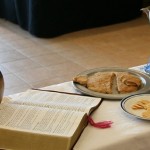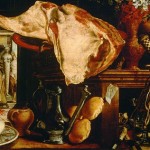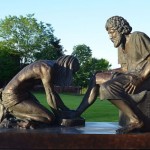“Let all that you do be done with love” (verse 14.) This is a fitting summary of Paul’s first letter to the Corinthian: a fitting summary of the corpus of Paul’s letters of love and labors of love; and a fitting summary, indeed, of the Law and the Gospel.
Jesus Christ Himself, when asked to name the greatest law, gave as His answer (which is the Answer): Love God and love neighbor. Every one of the Ten Commandments is about loving God or loving neighbor, and every one of the 613 laws of the Old Testament as well.
Everything that Paul has been teaching the Corinthians is therefore related to and summed up by the commandment to love. And everything that Paul has been teaching us is also summed up by the commandment to love.
Because love is the litmus test for our every thought, word, and deed, Paul commanded the Corinthians to take up a collection for the saints on Sunday, the first day of the week, when Christians gathered together to eat the Lord’s Supper. Each one was to lay up something to give, in this case to the Jerusalem church. This is a love offering above the tithe that went to the local church: it is alms for the saints, and it must be done, and done in love.
Out of love – love for God, love for the Ephesians (where he was attacked by the “wild beasts” clothed in the form of men), and love for the gospel, Paul decided to remain in Ephesus, because “a great and effective door has opened to me” (verse 9.) Knowing that there are many adversaries – the Jews and the silversmiths and the guardians of the temple of Diana – Paul remains anyway, out of love.
Out of love, we are to speak the same thing and not to have divisions among us (Chapter 1.)
Out of love for God, we consecrate God’s holy temple, and out of love for our brothers and sisters in Christ we edify God’s holy temple, which is His people among whom He lives (Chapter 3.)
Out of love for God, we are to purify His Temple when it becomes polluted and to deal with the sin in our midst, and out of love for our brothers and sisters we discipline those who are immoral and will not repent (Chapter 5.)
Out of love, we do not bring lawsuits against each other but rather allow ourselves to be wronged (Chapter 6,) for love keeps no record of wrongs.
Out of love for God and those whom God has put in our lives (and these are our neighbors), we gladly accept the station in life into which God Himself has placed us, whether Jew or Greek, slave or free, husband or wife, married or single (Chapter 7.)
Out of love for weaker brothers, we willingly give up our liberty to enjoy certain lawful things, that we might not cause them to stumble (Chapter 8.)
Out of love, so that we may be made love as God is love, we are willing to become all things to all people. Even when this is uncomfortable and not our preference, we use ourselves, our gifts and our talents, in whatever way we can so that by whatever means possible some may be saved (Chapter 9.)
Out of love for God, we eat and drink our Lord Jesus Christ, that He might give us His grace to make us participants in Him. Out of love for ourselves, we eat and drink worthily, with repentance and faith in the one who offers Himself to us (Chapters 10 and 11.)
Out of love for the Body of Christ, which is love for God and neighbor and self all rolled up into one, we use the diversity of gifts that God has given us for the good or edification of the whole Body and specific members in particular (Chapters 12 and 14.)
Out of His immense and eternal love, God the Father sent His Son to become a man, to die, and to be raised from the dead – for our good (Chapter 15.)
God, therefore, is love and the initiator of love in our lives. He is the example of love for us: not that we first loved God, but that He first loved us. Because we shall all be changed in the twinkling of an eye and resurrected in the image of our Lord, who has redeemed us by His love, we are to be new creatures, creatures of love in all that we do.
The power of the Resurrection is not therefore just a newfound power in our physical bodies that will never wear out in heaven: it is the power to love as God first loved us.
And because the new and eternal life that God has created in us out of His love has already been given to us and we have been enriched in everything by Him (1:5), we must practice love. For though I may speak with the tongues of men and of angels or can understand all mysteries and knowledge (Chapters 12 and 14); though I have all faith so that I could move mountains (Chapter 15 – faith in the Resurrection and in Christ); though I bestow all my goods to feed the poor (Chapter 16); and though I give my body to be burned (15:32, 16:9): it does not profit me, if I do not love as God has first loved me.
Prayer: Almighty Father, whose beloved Son on the night in which He was betrayed gave us the commandment to love and demonstrated it by His washing of our feet and giving Himself in His Supper; grant that we may by His love be able to love as You have first loved us. Amen.
Points for Meditation:
1. Meditate more fully on the ways in which God is calling you to love. It will be beneficial to review 1 Corinthians to find ways in which God is calling you.
2. Meditate on the love of God as it relates to the Resurrection and life in heaven.
Resolution: I resolve to find one specific way to practice love today. Do not pick what is easiest or most convenient but that to which you know God is calling you.
© 2013 Fr. Charles Erlandson












